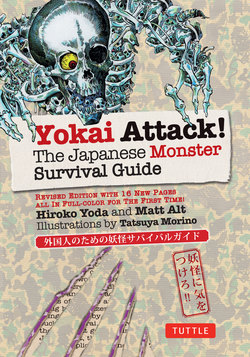Читать книгу Yokai Attack! - Hiroko Yoda - Страница 16
На сайте Литреса книга снята с продажи.
ОглавлениеFerocious Fiends: 003
Kappa
河童
Pronunciation:
(KAH-pah)
English Names:
Literally, “River Child”; Water Sprite, Water Imp, Water Goblin
Alternate Japanese Names:
Gawappa, Kawataro, Suitengu, Suiko
Gender:
Male
Height:
3 to 5 ft. (100 to 150cm)
Weight:
65 to 100 lbs. (30 to 45kg)
Locomotion:
Bipedal or quadrupedal (on land), webbed fingers/toes (in water)
Distinctive Features:
Beak-like mouth; Tortoise-like shell on back; Frog-like, removable skin; Water-filled depression on top of head; Three anuses and strong “fishy” odor
Offensive Weapons:
Claws, extensible arms, extreme flatulence
Weaknesses:
Dehydration, particularly of the “head dish,” which when spilled drains the kappa’s strength. Strong aversion to iron, deer antlers, and monkeys
Abundance:
Prevalent (But may be in decline due to global warming?)
Habitat:
Rivers, lakes, swamps, wetlands, and coastal areas
Claim to Fame:
If you’ve heard of any one yokai, it’s probably the kappa. Easily the single most famous yokai in Japan, this amphibious creature has long been feared as a vicious scourge of Japan’s rivers, swamps, coastlines, and other bodies of water. They are also known to take refuge in man-made structures such as cisterns and garden ponds. They are occasionally encountered on land in mountainous areas during the winter, when their watery homes freeze over. They can be tracked by their pungent body odor, said to be reminiscent of rotting compost. Kappa are the traditional “bogeymen” invoked by Japanese parents to frighten young children away from playing near lakes and rivers unattended.
According to one story, some nine thousand of the creatures swam en masse from China to Japan around the fifth century. Whatever their true origin, they have become the signature yokai of the Japanese folk pantheon.
The Attack!
Although generally considered unaggressive, a kappa can be absolutely vicious when angered. While particularly famous for challenging unwary passersby to mano a mano wrestling matches, they are also notorious for ambushing and drowning those foolish enough to swim in isolated or fast moving waters. One strategy is simply to drag a victim below the surface. Another is to remove a swimmer’s intestines from below, by punching a slimy hand through . . . well, use your imagination. The kappa isn’t after the entrails themselves, but rather the shirikodama, a mysterious organ said to be located in the colon.
Surviving an Encounter:
If challenged to a wrestling match:
1) Grit your teeth and graciously accept.
2) Bow deeply (you’re in Japan, after all). This will make it spill the contents of its head-dish, draining its power like water from a bathtub.
3) Insist on wrestling under bright sunlight to speed up evaporation. (Warning: this only works on sunny days.)
4) In a real pinch, fling a fresh cucumber—one of the kappa’s favorite foods—into the ring. This should distract it long enough for you to beat a hasty retreat.
Can kappa be repelled by farts? This 1881 woodblock print by Yoshitoshi seems to suggest as much.
If you’re confronted by a kappa in the water:
1) Don’t panic.
2) Work your way calmly back to shore.
3) The creatures have occasionally helped drowning children to the shore, so try acting childish. Who knows? It just might let you—and your colon—off the hook.
Kappa Couture:
Kappa must leave the water and remove their waterproof skin—called amagawa—in order to sleep. A kappa without its amagawa is totally defenseless: it can’t enter the water without it! Because of this, raincoats are also known as amagappa in Japan.
Kappa Sightseeing:
The Kappabashi (Kappa Bridge) area of Tokyo has, as its name suggests, a deep connection to these strange aquatic creatures. Legend has it that the very first Kappa Bridge was built by a raincoat merchant who enlisted kappa as laborers. The former site of the bridge is now occupied by the local Buddhist temple, Sogenji, also known by its nickname, Kappa-dera (Kappa Temple).
Kappa Maki Rolls
Kappa Cuisine:
The popular sushi dish kappa maki (cucumber roll) takes its name from this yokai.
KAPPA PROVERBS:
KAPPA NO KAWANAGARE: —“Even a kappa can drown”—is an idiom that means “even experts make mistakes.”
RIKU NI AGATTA KAPPA:—“Like a kappa on land”—is a saying that refers to situations where someone is out of their element.
HE NO KAPPA:—“Like a kappa fart”—is the Japanese equivalent of the American idiom “a piece of cake!”
KAPPA-HAGE—Term for a man with a round bald spot on the top of his head.
